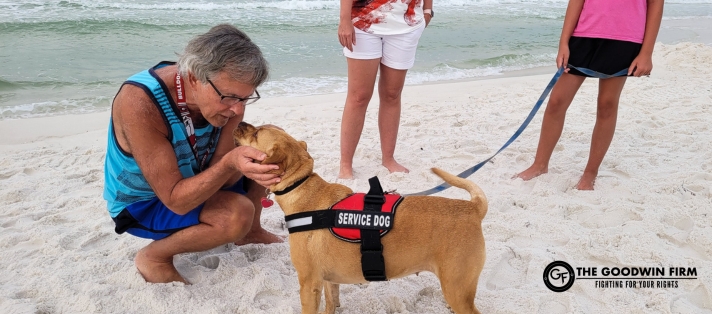Can service animals be denied access to properties?
Under the Americans with Disabilities Act (ADA), non-profit organizations, businesses, and state and local governments that serve the general public must allow service animals and their handlers in all areas of the facility where the public is allowed to go.
A service animal, however, can be denied access to certain properties or areas of a facility if its presence would get in the way of the facility’s legitimate safety requirements. What’s more, an individual with a disability may be asked to remove their service dog if the dog is not housebroken or is out of control and the handler can’t control it.
Service animals are not pets, and they’re specially trained to assist their handler with a physical or mental disability. That said, only dogs and, in some cases, miniature horses, are considered service animals.
Can Service Animals Be Denied Access? – Overview of Service Animal Access Rights
The ADA makes it unlawful to discriminate against individuals on the basis of disability. Service dog handlers have protected rights when it comes to transportation, housing, and public access. When you have a service dog, you have the right to access all public and private facilities where the general public is allowed.
This can include but is not limited to hotels, apartments, or housing; restaurants, retail locations; workplaces, beaches, hospitals, offices, theaters, parks, universities, sports venues, fitness centers, and concert halls. Service dogs can also accompany their owners on airplanes free of charge.
Neither a fee nor a deposit may be required as a condition of allowing a service animal to access public accommodations. Service dog handlers cannot be isolated from other people or treated less favorably than others. Also, the establishment cannot limit service dogs and their handlers to a special area.
How Businesses Can Tell if a Dog is a Service Animal?
Service animals are typically not required to carry a tag or vest that shows they’re working animals. As such, it is not always obvious when a dog is a service animal.
A guide dog can easily be recognized as a working animal; however, it may not be obvious when a person with PTSD or diabetes carries a dog to help them deal with their health condition.
To verify a service dog’s eligibility, business owners and their staff are only allowed to ask two questions:
- Is the service animal required because of a disability?
- What task has the service animal been trained to perform?
It’s worth noting that business owners and their staff are not allowed to ask about the nature or extent of the person’s disability or demand medical documentation or a special identification card as proof of service dog status.
Faking the need for an assistance animal is outlawed.
Where Are Service Animals Not Allowed?
Your service animal may be denied access to certain properties under certain situations, conditions, and/or locations.
here are instances where a service animal handler may be asked to remove their animal from the premises.
These include cases where:
- The service animal is not housebroken
- The service animal is out of control, and the handler cannot manage it or isn’t bothered to keep it under control
- The service dog misbehaves and poses a direct threat to the safety and well-being of other people
- Accommodation of a service animal would cause fundamental interference with the nature of the services, goods, activities, or programs that a covered entity provides to the public.
In such cases, however, the service animal handler should be offered the opportunity to obtain goods or services without the presence of the animal.
There are some of the areas where service animals may be excluded:
Swimming Pools
Service dogs are generally not allowed in swimming pools for health reasons. Your service dog can be in areas surrounding the pool, but they cannot be allowed in the water. If you’re in distress, however, your dog will have ADA protection to jump in and save you.
Zoos
A zoo reserves the right to designate some areas off-limits to service dogs. These are areas where the dog is the natural predator or prey of the displayed animal. The dog’s presence as a service animal may cause undue stress, anxiety, or disturbance among zoo animals. Some zoos provide kennels and crates to shelter the dog until the handler can pick them up later.
Hospital Areas
When it comes to hospital access rights, service animals are allowed to accompany their handler into all non-sterile, public areas. Simply put, service dogs are allowed in patient rooms, doctor’s offices, some labs, cafeterias, gift shops, and other “public” areas.
It may be appropriate, however, to exclude a service dog from the ICU, burn units, trauma areas, operating rooms, maternity wards, and other areas where masks, footwear, and specific precautions are taken for the safety of patients. Typically, these are areas where the presence of the animal may compromise a sterile environment.
Breweries and Food Production Facilities
Service animals are not allowed in food production facilities and breweries due to sanitation regulations and health concerns.
Production Facilities
Your service dog may not be allowed in facilities where allergen-free items are produced.
Classrooms or Workplaces
A service dog may be excluded from accessing areas designated for students or employees allergic to dog fur. However, both the disabled individual and the allergic person should be accommodated where possible, for example, by assigning them to different areas within the room or facility.
Contact The Goodwin Firm for Service Animal Legal Assistance and Learn if Service Animals Can be Denied Access
If you’ve been wrongfully denied the right to bring your service animal to a public or private area covered by ADA guidelines, The Goodwin Firm can help. Our Florida animal rights attorneys can advise you about your rights. We’ll help you file a complaint if you have a claim, and provide representation during settlement negotiations or in court during a trial.

